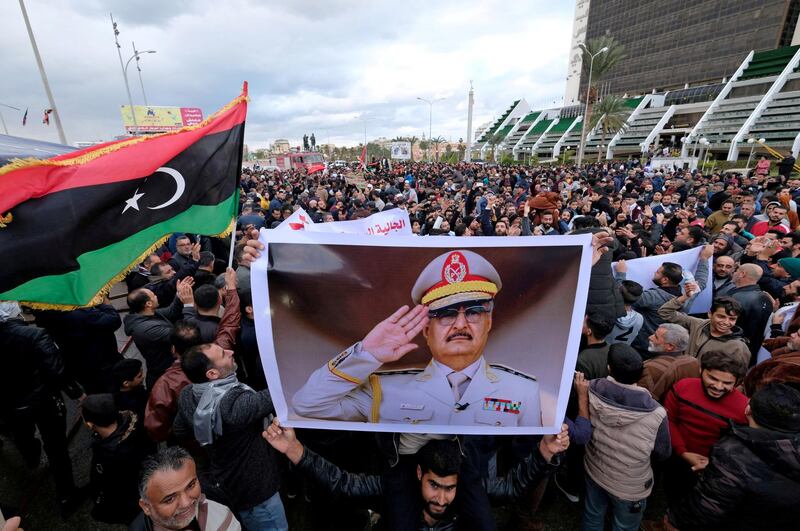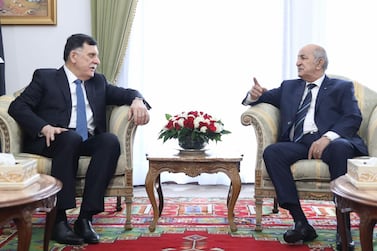Saudi Arabia and Egypt condemned Turkey’s decision to send troops to Libya in support of the Government of National Accord.
The kingdom’s foreign ministry said “the recent Turkish escalation in Libya” and the Turkish parliament’s approval of a troop deployment to Libya is a breach of UN Security Council decisions, state news agency SPA reported.
It said that “the kingdom affirms that this Turkish escalation poses a threat to the security and stability in Libya and a threat to Arab and regional security, as it is an interference in the internal affairs of an Arab country in flagrant violation of international principles and covenants”.
Egypt said any such deployment could “negatively affect the stability of the Mediterranean region” and called on the international community to respond urgently to the move.
Meanwhile, forces loyal to Field Marshal Khalifa Haftar said yesterday they had taken control of the strategic coastal city of Sirte in a rapid advance preceded by air strikes.
Holding Sirte would be an important gain for Field Marshal Haftar, who since April has been waging a military offensive on the capital, Tripoli, home to the GNA.
Sirte lies in the centre of Libya’s Mediterranean coast, and has been controlled by GNA-aligned forces since they ejected ISIS from the city with the help of US air strikes in late 2016.
Turkey began sending fighters to Libya yesterday to undertake a co-ordination role, said Turkish President Recep Tayyip Erdogan, as an EU trip to Tripoli was postponed.
Mr Erdogan said Turkey would not be sending its own combat forces to Libya, despite having a mandate from the Turkish parliament, who passed a bill last week allowing the government to send troops to assist the government in Tripoli.
“Right now, we will have different units serving as a combatant force,” he said, without giving details on who the fighters would be and where they would come from. Senior Turkish military personnel would co-ordinate the “fighting force”, Mr Erdogan explained, sharing their experience and information to support Tripoli.
The news of the troop deployment came as Libya’s Government of National Accord announced that a planned visit of a high-level European delegation to Tripoli scheduled for today had been postponed as a result of “the circumstances the capital is undergoing”.
The European Union’s newly appointed chief diplomat Josep Borrell had been due to make the trip alongside the foreign ministers of the UK, France, Germany and Italy. The EU’s new foreign policy representative said the UN peace process needed support.
“Today, it is more urgent than ever to work genuinely towards a political solution to the crisis in Libya,” he said yesterday.
“The European Union calls on all sides to engage in a political process under the leadership of the United Nations. The European Union will continue to use all efforts to find a peaceful and political solution to this process.”
Sources close to the diplomatic exchanges said there were still plans for the visit to go ahead but security concerns and the Iran crisis forced a postponement. Germany hopes to hold a conference on Libya next week that would reinvigorate UN-led mediation between the warring factions.
Tomorrow’s delegation was expected to meet GNA head Fayez Al Sarraj to discuss preparations for the summit in Berlin dedicated to Libya.
Libya's Foreign Ministry said it also planned to talk about the assault by forces aligned with Field Marshal Haftar. Mr Al Sarraj last week made a formal request to Turkey for military support and the two nations signed security and maritime agreements in November last year. Ghassan Salame, the UN envoy to Libya, last week told Le Monde newspaper that the UN's credibility was being tested by the deteriorating situation in Libya.
A statement by Mr Borrell yesterday said the EU remained supportive of the UN-led process to find a peaceful settlement in Libya but that time was running out.
“Recent developments in Libya indicate that an escalation of violence around Tripoli could be imminent,” he said.
The foreign affairs chief expressed concern about an attack on a military academy in Tripoli that killed dozens of cadets at the weekend.
It followed a call between Mr Borrell and UN Secretary General Antonio Guterres at the weekend during which Libya was on the agenda. Mr Borrell said that “the UN at its core remains the cornerstone of the EU’s foreign policy”.
German Chancellor Angela Merkel will travel to Russia this week to discuss Libya with President Vladimir Putin.
Tomorrow, Egyptian Foreign Minister Sameh Shoukry will host talks in Cairo with France, Italy, Greece and Cyprus that will examine Turkish activity in the eastern Mediterranean.







